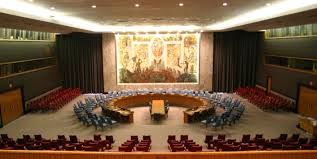A
abujagirl
Guest
The UN Security Council has unanimously adopted first resolution on Security Sector Reform (SSR), reaffirming the central role of SSR in conflict prevention, peace building and development.
The Nigeria-sponsored Resolution 2151 was introduced during its month-long presidency of the Security Council and co-sponsored by many countries, including the UK, U.S., France and Luxembourg.
It was adopted on Monday in New York after a day-long debate chaired by the Minister of Foreign Affairs of Nigeria, Amb. Aminu Wali.
The resolution reaffirmed the importance of such reform in stabilising countries recovering from conflict and resolved to prioritise reform aspects in both peacekeeping and special political mission mandates.
The 15-member council reiterated the centrality of national ownership for security sector reform processes, recognising the need to consider host country perspectives in the formulation of peacekeeping and special political mandates. It encouraged states to take the lead in defining an inclusive national vision on security sector reform, informed by the needs of their populations.
The resolution noted that the UN was well positioned to support and coordinate sector-wide reforms as necessary in specific situations. It added that the UN also had broad experience as well as comparative advantages in this area, working in close collaboration with relevant international and regional actors.
It also acknowledged the important role that UN police could play in supporting and coordinating international support for reform of national police institutions.
Earlier in his remarks at the opening of the debate, Wali expressed delight that security sector reform was now a firmly established component in multidimensional peacekeeping operations.
He recalled that Nigeria had presided over the council's open debate in 2011, during which members issued a presidential statement requiring the Secretary-General to review the role of the UN in security sector reform.
He commended the UN Secretary-General Ban Ki-moon's response to the subject by issuing his second report on SSR.

The Nigeria-sponsored Resolution 2151 was introduced during its month-long presidency of the Security Council and co-sponsored by many countries, including the UK, U.S., France and Luxembourg.
It was adopted on Monday in New York after a day-long debate chaired by the Minister of Foreign Affairs of Nigeria, Amb. Aminu Wali.
The resolution reaffirmed the importance of such reform in stabilising countries recovering from conflict and resolved to prioritise reform aspects in both peacekeeping and special political mission mandates.
The 15-member council reiterated the centrality of national ownership for security sector reform processes, recognising the need to consider host country perspectives in the formulation of peacekeeping and special political mandates. It encouraged states to take the lead in defining an inclusive national vision on security sector reform, informed by the needs of their populations.
The resolution noted that the UN was well positioned to support and coordinate sector-wide reforms as necessary in specific situations. It added that the UN also had broad experience as well as comparative advantages in this area, working in close collaboration with relevant international and regional actors.
It also acknowledged the important role that UN police could play in supporting and coordinating international support for reform of national police institutions.
Earlier in his remarks at the opening of the debate, Wali expressed delight that security sector reform was now a firmly established component in multidimensional peacekeeping operations.
He recalled that Nigeria had presided over the council's open debate in 2011, during which members issued a presidential statement requiring the Secretary-General to review the role of the UN in security sector reform.
He commended the UN Secretary-General Ban Ki-moon's response to the subject by issuing his second report on SSR.


